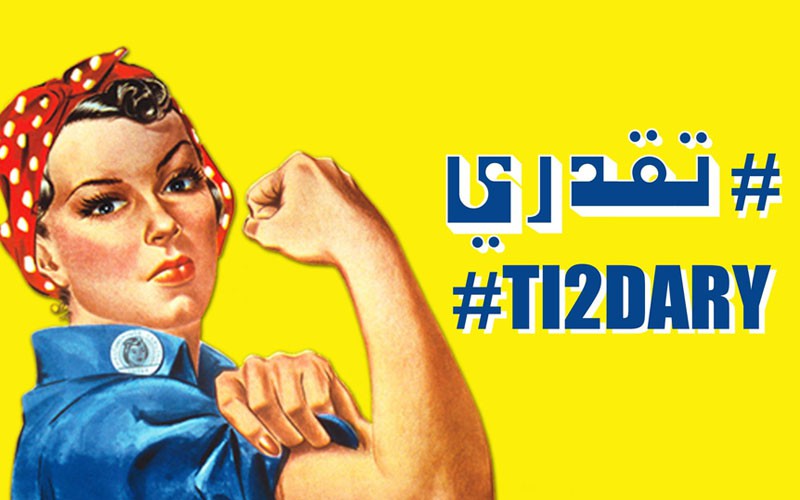It’s common knowledge that it isn’t easy being a woman in Egypt. This is not only due to the widespread misogyny that is not only existent, but is highly encouraged by the Egyptian society, but also due to the fact that when women do choose to do something, they are – most of the time, at least – told that they can’t. Women’s problem is no longer that they’re asked to do too much. It is that they are okay with this and want to do more and be completely independent, but are being told not to. While this could possibly result in producing a new generation of defeatist women, there is evidence that it might be doing the exact opposite. Enter Ti2dary, a project aimed at empowering women and reminding them that, in fact, do whatever they want. They’ve launched their campaign with a tutorial on how to change a car tire. So far, the campaign has received so much praise from women and men alike. We spoke to Sarah Gohar and Aisha Samy, founders of Ti2dary, to find out more about the campaign.
“we’re trying to shatter the image of women being unable; we’re taking it bit by bit”
The campaign came as a result of Sarah and Aisha’s observations on how much Egyptian women’s attitude has changed, “older women are very handy; they know how to do things and that is an important aspect of life”, Sarah says, “knowing how to do things that are good for you and your family and for your survival is a diminishing culture here and I thought ‘why not bring it back?’”.
This campaign could snowball into something much bigger than DIY tutorials, “we’re trying to shatter the image of women being unable; we’re taking it bit by bit”, Aisha says, “we won’t tell them out of the blue that they can make their dreams come true, we’ll start by giving them strength and telling them how to unclog a drain or change a light bulb”. In a male-dominated society, men sometimes can be easily threatened by women empowerment, Aisha says there is no reason for this to even happen, “we’re not challenging men, we’re saying we can be strong”.
“we’re not challenging men, we’re saying we can be strong”
The campaign’s support doesn’t only come from women, it also comes from men, “sometimes you hear women saying that Arab men have a certain ‘mentality’ and that is true, but at the same time I have to say I’ve seen men supporting Ti2dary”, Sarah says. It’s expected to see such a positive reaction, especially since Ti2dary stands out from other campaigns, “we’re a forum that makes videos that provide women with practical knowledge to help them with day to day life”, Sarah explains, “working with them on a micro-level, hoping that this should provide a bigger effect, whether it’s in their career, personal life or relationships”.
“I’m not saying things will change overnight, but I guess you can say what happened with Reham Saeed – people standing up for this girl – is a good sign”
Ti2dary is not only teaching women how to do things they have been long told they couldn’t do, it’s also working on introducing role models that might have been neglected in the past. The page has already launched this campaign by introducing Lutfiyah Al Nady, an Egyptian woman who was the first woman to receive a license to be a pilot and fly an airplane in 1933.
The Egyptian society has been witnessing a few changes recently, Ti2dary might be able to contribute to that, “I’m not saying things will change overnight, but I guess you can say what happened with Reham Saeed – people standing up for this girl – is a good sign”, Sarah says.
“the problem isn’t just in the men, it’s the women who accept this. Women need to discover their own capabilities and moreover know their rights”
At the end of the day, Ti2dary isn’t a women’s rights organization calling for drastic changes, their main focus is showing women what they are capable of, “the problem isn’t just in the men, it’s the women who accept this. Women need to discover their own capabilities and moreover know their rights”, Aisha says. These Ti2dary, physical lessons, could be able to strengthen women with actions rather than words, “you might see people talking about women’s rights on TV but it comes down to the concrete world. It’s not easy to apply it”, Sarah says, “it’s not tangible. What we’re working out is helping them on a micro level in a tangible thing”.

